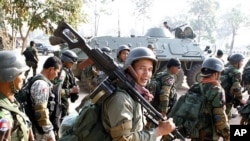The Association of Southeast Asian Nations is trying to negotiate an end to the clash between Thai and Cambodian forces. The fighting is the most serious conflict ever seen between two ASEAN countries and is seen as a test of the organization's ability to maintain peace and stability in the region.
Indonesian Foreign Minister Marty Natalegawa traveled to Phnom Penh on Monday. Indonesia has the chairmanship of the Association of Southeast Asian Nations, which is trying to persuade Bangkok and Phnom Penh to call a ceasefire and negotiate an end to fighting that began Friday.
On Monday, fighting was again reported near the Preah Vihear Hindu temple, a 900-year-old along the border.
The fighting has rattled other members of ASEAN, and challenges one of its main purposes - to maintain stability and peace in the region. Some regional security experts say the organization's core principle of not interfering in the internal affairs of its members limits its effectiveness.
Carl Thayer, a Southeast Asia specialist with the Australian Defense Force Academy, is concerned by the lack of restraint by both sides. He calls the escalating conflict the most serious dispute between ASEAN members since the organization was founded in the 1960s.
"I am worried about good command and control and the politicization of the issue," Thayer admitted. "In other words this is not the way two ASEAN countries should be behaving. And if it is the rules of engagement are tit for tat, that is a sad commentary on the professionalism of the forces on either side."
Thayer says resolving this crisis will be a test for the Indonesia, as chairman of ASEAN. Because Indonesia is a respected, neutral party, Thayer says Natalegawa could succeed in persuading both sides to pull back before the entire region is affected.
"It can bring home to Cambodia the impact this is going to have on its neighbors," Thayer said. "It affects overall perceptions of the region and its ability to put its house in order and therefore those countries that more virtuous and better governed are punished for the action of Thailand or Cambodia because of exaggerated nationalist claims."
Thayer says Natalegawa is likely to propose a number of measures to stabilize the situation, such as removing troops from the area, and allowing in foreign observers to make assessments.
If mediation fails, Thayer says ASEAN can impose economic sanctions but it has never in the past taken coercive measures on one of its members.
Thailand-Cambodia Dispute a Test for ASEAN
- By Brian Padden





